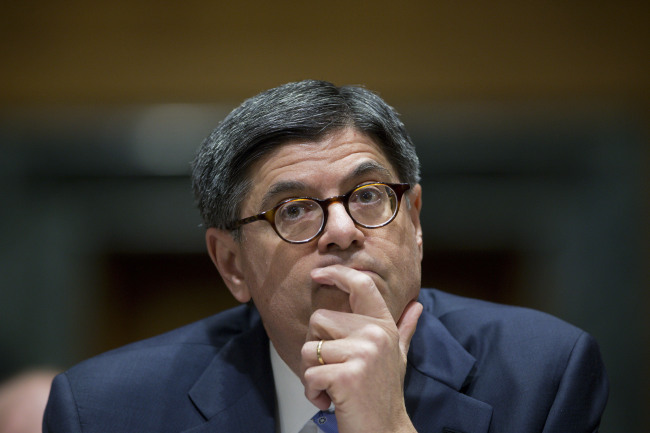WASHINGTON (AFP) ― The United States warned Wednesday that the global economy cannot endure a “European lost decade,” criticizing “status quo policies” in the eurozone ahead of the G20 summit this week.
Treasury Secretary Jacob Lew said in a speech that monetary easing by the European Central Bank is not enough to avoid a deeper slump across Europe.
And he said that other countries should not rely on the U.S. economy to prop up global growth.
“The world cannot afford a European lost decade,” Lew said, according to the text of his speech at the World Affairs Council in Seattle.
“The ECB has taken forceful steps to support the economy through accommodative monetary policy.”
“But as recent economic performance suggests, this alone has not proven sufficient to restore healthy growth. Resolute action by national authorities and other European bodies is needed to reduce the risk that the region could fall into a deeper slump.”
 |
U.S. Treasury Secretary Jacob Lew. (Bloomberg) |
Underscoring a growing worry that the global economy is turning downward, Lew added that other countries are relying too much on the United States to prop up global growth.
“The world fundamentally needs more demand,” he said.
“The global economy cannot prosper broadly relying on the United States to be the importer of first and last resort,” he said.
“Nor can it rely on the United States to grow fast enough to make up for weak growth in major world economies.”
“The world is stronger if we all take steps to bolster domestic demand.”
Lew’s comments came ahead of the annual meeting of leaders of the G20 group of economic powers in Brisbane, Australia this weekend.
Sluggish global growth and backsliding by the eurozone economy are expected to be key topics in the summit.
Lew emphasized the need for more fiscal efforts ― elevated government spending and other approaches ― in the United States and elsewhere to strengthen growth.
“By using fiscal space where available to make critical investments in people and infrastructure ... policymakers can put their respective economies on the right track and contribute to shared global prosperity.”
Lew applauded Japan’s combination of monetary and fiscal stimulus in its efforts to fire up growth after more than a decade of stagnation.
But he added that Prime Minister Shinzo Abe needs to follow through on the third thrust of its “three arrows” policy ― structural reforms ― to make sure that the gains from central bank stimulus and government spending are not lost.
“The test will be whether the third arrow is sufficient to transform Japan’s economy, and the jury is still out,” he said.
Lew held out the U.S. recovery from the 2008-2009 Great Recession as an example for Washington’s main G20 partners.
“Over the past four and a half years, the private sector has created more than ten and a half million new jobs, the longest stretch of private sector job growth in our nation’s history,” he said.
“In fact, we have created more jobs since the pre-crisis peak than Europe and Japan combined.”
But he also said that the United States itself needs to do more to strengthen economic momentum, citing President Barack Obama’s proposals for immigration and tax reforms, a higher minimum wage, and more spending on infrastructure.





![[Exclusive] Hyundai Mobis eyes closer ties with BYD](http://res.heraldm.com/phpwas/restmb_idxmake.php?idx=644&simg=/content/image/2024/11/25/20241125050044_0.jpg)
![[Herald Review] 'Gangnam B-Side' combines social realism with masterful suspense, performance](http://res.heraldm.com/phpwas/restmb_idxmake.php?idx=644&simg=/content/image/2024/11/25/20241125050072_0.jpg)

